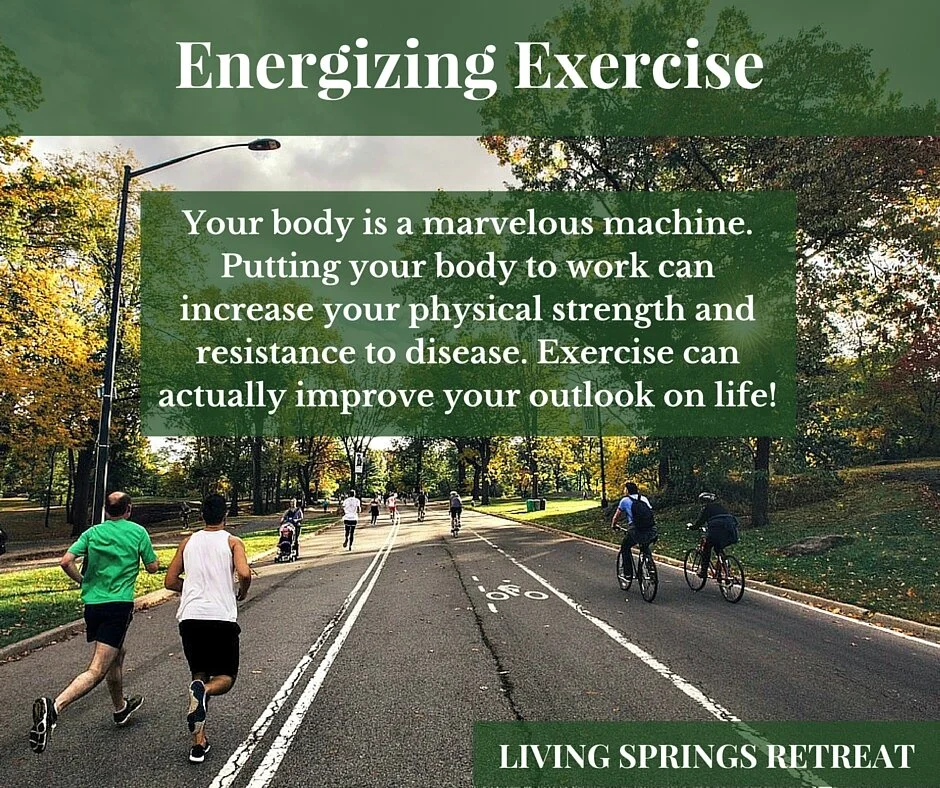Overcoming Depression
by Living Springs Retreat Health Educator
An Ounce of Prevention
“an ounce of prevention is worth a pound of cure”
Have you ever heard the phrase, “an ounce of prevention is worth a pound of cure?”1 It was coined by the late Benjamin Franklin. Franklin was talking about fire safety, but today, the phrase is very applicable to health. When you really think about it, prevention of disease is indeed “medicine.” A healthy body certainly doesn't come by accident. In this day and age, it’s easy to pop a pill in your mouth and just go on about your business. You hope that the sickness you are fighting goes away eventually. When it doesn't, you wonder what else can be done. Medications may treat the symptoms of the disease, but miss the underlying cause. And finding the cause can lead to finding a solution.2 Who doesn't want a solution?
Depression
Let's talk about the disease called depression. Over 60 million Americans suffer from mental health issues. There has been an alarming increase worldwide since 1915, and research shows that more people miss work due to depression than any other disease, costing $90 billion in America, and $20 billion in medications alone.3
Dr. Neil Nedley, M.D. counsels people who suffer from depression. According to medical research, major depression can be defined according to a listing of 10 symptoms. The person has 5 of the 9 symptoms during two weeks: emptiness and deep sadness, apathy (meaning there is no excitement about the day's activities), sleep disturbances (either too little or too much sleep), early morning awakening, weight or appetite change, lack of concentration (tend to put off decisions), fatigue, feelings of worthlessness, and morbid thoughts.4 According to the Mayo Clinic, “Depression is a mood disorder that causes a persistent feeling of sadness and loss of interest. Also called major depressive disorder or clinical depression, it affects how you feel, think and behave and can lead to a variety of emotional and physical problems. You may have trouble doing normal day-to-day activities, and sometimes you may feel as if life isn't worth living.” More than just a bout of the blues, depression isn't a weakness and you can't simply "snap out" of it. Depression may require long-term treatment.4b
What Must We Do?
The research shows that depression is very complex, with many factors interacting with one another. It is clear, many people suffer from it. But what can a person do on a day to day basis to prevent the disease? Further, what practical lifestyle habits can a person adapt to counter symptoms that already exist? The goal of this article is to share healthy lifestyle habits that can help prevent the dangerous disease of depression.
Ways to Have a Healthier Brain
The excellent news: no matter how complex these factors are that exist with depression, you can make changes.5 The Bible says in Proverbs 13:12, “Hope deferred maketh the heart sick: but when the desire cometh, it is a tree of life.” The heart is referred to here as the mind. We can make improvements in the brain simply by making better choices day by day. Look at the end result...”a tree of life!” This means there's great reward to cultivating hope in our lives. For starters, dare to drink more water. A depressed mood is a symptom of dehydration. Our brains are electrical, and we need the hydro power so that they can function optimally. To figure out if you are drinking enough water, take your body weight in pounds and divide it by the number two. The product equals the number of ounces you need to drink. You can then divide that number by eight and you will get exactly the number of glasses of pure drinking water you need per day. It’s recommended that you drink even more water if you exercise on a regular basis. Keep your water bottle handy to remind you to drink. You will feel the positive results!
The Right Mental Activity
The brain needs analytical activity. Bible study strengthens the mental faculties. Study the book of Proverbs or the book of Daniel. Work with your hands each day, for example, chop up your vegetables, wash the dishes by hand, garden or do yard work. Idleness is not beneficial. Research supports that television watching is one of the worst things you can do for the mind. It increases aggression, decreases creativity, hinders a person's ability to be more persistent with tackling a problem, and weakens brain power.6 Educational documentaries are not included in the category of television viewing.
Food for the Brain
The frontal lobe is the largest lobe of the brain's five lobes. It is where the will resides, and it is the executive center of the mind. What you eat affects the frontal lobe. Here's how the process works: the food you eat gets broken down, assimilated, and then on a microscopic level the nutrients goes into our bloodstream and then to every organ. To combat depression, choose the most widely nutritious foods as possible. Research shows that your brain needs the following: Serotonin, Omega 3 Fatty Acids, Folic Acid, and Vitamin B12. Low levels of serotonin, which is a neurotransmitter, are associated with a depressed frontal lobe. The body needs serotonin in order to make a very important amino acid called tryptophan. You can find tryptophan in foods such as tofu, pumpkin seeds, non- hybridized wheat, sesame seeds, almonds, black walnuts. Omega 3 fatty acids reduce the risk of depression and are vital for fighting depression if one has had it before. Sources of Omega 3 include: one tablespoon of flaxseed oil, one-quarter cup of chopped walnuts, one tablespoon of wheat germ oil, and one cup of green organic soybeans. You can also grind up flaxseed and eat it on salads or fruit. Folic acid (or folate) deficiency can be a direct cause of depression. Food sources of folate include: chickpeas (garbanzo beans), black-eyed peas, lentils, red kidney beans, okra pods, navy beans, spinach, and mustard greens. Vitamin B12 deficiency is related to depressed mood. An eight-ounce glass of Soy Dream soy milk contains 1.00 mcg. Many people choose a B12 supplement. Although many associate B12 deficiency with a vegan or vegetarian diet, only a small percentage of people with the deficiency are vegetarian.7 Ask your doctor to run a blood panel test to check your levels of Vitamin B12. See what your numbers are and ask your doctor to help you to take action if the level is low. To feed your body well means to eat the colors of the rainbow. The next time you are at the produce section of the grocery store, scan the shelves. Take in all of the beautiful colors of the fruit and vegetables. They contain antioxidants and phytochemicals, which are good for brain power. Buy and eat! Make sure to consume legumes, grains, nuts, and seeds, all of which will promote brain health.
Breathe The Open Air
Spending time outdoors cannot be underestimated when it comes to health and well-being. The colors of nature, particularly blue and green, relax the nerves and fight fatigue. The fresh oxygen fuels the brain. “Oxygen is one of the best blood purifiers, and one of the most effective nerve tonics. It is amply provided by nature for all. Useful work in the open air will bring new strength and vitality and give a happy and cheerful attitude and mind.”8 When a person uses the diaphragm-or belly muscles-to breathe, he is getting enough oxygen into his body. Shallow breathing - or chest breathing - on the other hand, doesn't supply enough oxygen, and can negatively affect mental health. “One study showed that lower oxygen levels adversely affect mood.”9 One of the best natural “tonics” is to go outdoors and spend 5-10 minutes inhaling through your nose and exhaling through your mouth. It’s that simple. Lie down, sit, or go for a walk while breathing from your belly. Push the inhaled air down into the belly, which should expand because of the intake of air. Exhale the air out of the lips like you are blowing out candles. An amazing breathing exercise is the 4-4-6 method. To do this, inhale for 4 counts, hold the air in for 4 counts, and exhale the air out slowly for 6 counts. Go for 5-10 minutes. See if you don't feel instantly more relaxed. Doing this exercise will help you to incorporate proper breathing at all times. It will become more automatic for you as you continue to practice. There would be far less disease if proper breathing were practiced in daily life.
Sun Therapy
The sun is useful in treating many medical conditions and doctors term this “phototherapy”. Sunlight is used to enhance moods because it stimulates serotonin production in the body. 10 It also benefits those with sleep disorders by helping them to regulate melatonin and circadian rhythm, which enable them to rest soundly at night. If you live in the United States, getting sunlight exposure at least 30 minutes after sunup and at least 30 minutes before sundown is recommended. There are people who experience Seasonal Affective Disorder (SAD) , and this condition has identical symptoms to depression, but resolves when the people are exposed to bright light for at least 30 minutes per day. For those who live in the northern latitudes, such as Scandinavian countries or Alaska, 30 minutes exposure to artificial light (2,000-10,000 lux) can be used to a fight depressed mood. Researchers believe this type of light causes a chemical change in the brain that lifts your mood and eases other symptoms of SAD. 11 If you live in an area that does not receive a lot of sunlight, check with your physician to see if the artificial light would be right for you.
Sunlight will also provide the body with Vitamin D, a very important vitamin that we cannot get from food, and a vitamin our bodies need to manufacturer nutrients, such as calcium. Dr. James Marcum, cardiologist, states, that we need vitamin D for our mental health, bones, and other important chemical reactions. Sunlight exposure stimulates our bodies to produce vitamin D.12 Researchers viewed Vitamin D levels among 11 patients at a psychiatric outpatient unit in Sweden. They found that only 14.5% of the patients had the recommended optimal levels of Vitamin D. Those with schizophrenia and autism had the lowest levels among the patients and Vitamin D supplementation resulted in considerable psychiatric improvement.” 13
Move and Feel Better
Regular exercise builds resilience. Go for a brisk walk. Later, if you can, progress to a walk-run pattern for at least 30 minutes for 3 times per week minimum. Six times per week is even better. Aerobic exercise combats depression because it increases levels of serotonin in the brain, alleviates anxiety, produces brain derived neurotrophic factor, and decreases the risk of many diseases such as high blood pressure and obesity. It is noteworthy that researchers claim exercise is as good as medicine for reducing depression. 14 So, choose your favorite form of exercise, whether it be rebounding, walking, cycling, jogging, floor aerobics, etc., and stick to it regularly. Even better, would be to exercise outdoors in the sunlight and receive triple the benefits. Try to avoid the same modes of exercise day after day, because variety is best for mental health. Invite a friend or family member who will do it with you if you don't want to do it alone. Your brain and body will get in shape! You can't afford not to exercise.
Temperance
Over one hundred years ago, a wise author quoted, “Temperance teaches us to dispense entirely of that which is hurtful, and to use judiciously that which is healthful.” 15 This mentality keeps our lives balanced and helps cultivate awareness of potential dangers. These “dangers” are bad habits. Bad habits produce futures we do not want. White, refined sugar, although tasty, injures our mental health. We need a steady consistent delivery of fuel, but refined sugar provides a fuel spike and then shortly later, there's a corresponding drop in energy. Reach for the complex carbohydrate foods such as whole grains, legumes, and whole fruits. You will feel so much better when you do so! Your energy will be steady and your mind will feel relaxed because its operating on the proper fuel. The will power is located in the prefrontal cortex of our brains. As stated earlier, this is where our reasoning and decision making take place. The healthier the mind, the easier it will be for you to say “no” to sugary foods.
The good news is that it takes about 60 days to develop a new habit. That's only two months! Because we are “creatures of habit” this time period can seem like a very long time, however, when your goal is better health, consider doing whatever it takes to feel better and happier. Disciple never hurt anyone, in fact, it helps us grow. Start making positive changes today and day by day it gets easier to follow.
When it comes to temperance, remember that all good things should be done in moderation. For example, we need to eat food, but for strength, and not in excess. We also need to work, but not in excess. To achieve any realistic goal, one has to operate with temperance in the lifestyle. For example, don't take work home with you from the office if you know you'll stay up way too late doing it. Staying up too late can sabotage your health. Sleep is so crucial to having a strong mind and body! You can't afford to lose one nights' good sleep. We must reason from cause to effect when making decisions.
Get on Schedule
“To combat depression and anxiety, establish a schedule in your home. Have regular meal times, regular exercise time, and regular go-to-bed time. When the body gets on a schedule, you know what to expect, which helps your brain.”
Our bodies run on an internal clock, running naturally on a rhythm called Circadian Rhythm. So, having a regular bedtime and a regular awake time is crucial to good mental health. “Mentally healthy people with no known risk factors for depression can become depressed if the circadian rhythms are significantly disturbed. This fact suggests that circadian rhythm disturbance is one of the root causes of depression.” 16 To combat depression and anxiety, establish a schedule in your home. Have regular meal times, regular exercise time, and regular go-to-bed time. When the body gets on a schedule, you know what to expect, which helps your brain. Sleep is crucial for optimal brain power and resilience to disease. It is recommended that school-aged children get at least 10 hours, teenagers 9-10 hours, and adults 7-9 hours per night. Having a sleep deficit increases the risk of heart disease, kidney disease, high blood pressure, diabetes, stroke, obesity, car crashes, anger, depression, mood swings, risk-taking behavior, attention span problems, and academic difficulties.17 When we take responsibility, and go to bed early, we give our body the opportunity to charge us up against disease, and mental, social, and physical problems. In fact, the hours slept before midnight are proven more effective than the hours slept after midnight. When we sleep at night, the body undergoes a healing process. Adaquate sleep helps the brain to form new pathways and remember information. Let's take advantage of the health benefits of a good nights' rest. Try it out and see if it doesn't affect your mood and level of happiness.
Who Do You Trust?
There is a well-known group-bonding exercise where one person stands on a stage with her back facing the audience. Her teammates stand on the floor beneath the stage facing each other and lock arms. The person on stage then falls backward and trusts she will be caught in her teammates' arms. She's not looking as she falls, she just trusts that she will be caught in the strong arms of her teammates. My question for you is: who do you trust?
Humans fail and make mistakes, but the God of Heaven and Earth never fails or makes mistakes. He never changes (Malachi 3:6. In fact, He knows everything about you. Just as He told Jeremiah, He tells you today, “Before I formed thee in the belly I knew thee...(Jeremiah 1:5)” The God of Heaven desires a relationship with you. He knows about your mental health and your physical health, and He wants you to be healthier and happier than you are right now. The Psalmist writes, “The Lord is my Shepherd, I shall not want.” (Psalms 23:1) God's character is likened to a faithful shepherd who guards and protects His vulnerable sheep. Sheep can be very stubborn creatures, but He won't allow one to go missing from His care. The hours of solitude on the green pastures, He wants to spend with you. He's waiting for you. He can give you the will power to make good decisions. He can help you overcome any problem. And if you or someone you know is struggling with depression, He can give the victory over that as well! “The things which are impossible with men are possible with God.” (Luke 18:27)
1 https://www.ag.ndsu.edu/news/columns/beeftalk/beeftalk-an-ounce-of-prevention-is-worth-a-pound-of-cure/#:~:text=The%20Benjamin%20Franklin%20axiom%20that,org)%20under%20an%20assumed%20name.
2 Dr. Neil Nedley, Depression The Way Out, p.31
3 Dr. Neil Nedley, How to Improve Your Brain. Depression & Anxiety Recovery Program.
4 Dr. Neil Nedley, How to Improve Your Brain. Depression & Anxiety Recovery Program.
4b Mayo Clinic: https://www.mayoclinic.org/diseases-conditions/depression/symptoms-causes/syc-20356007
5 Dr. Neil Nedley, Depression The Way Out, p. 32
6 Dr. Neil Nedley, Proof Positive: How to Reliably Combat Disease and Achieve Optimal Health Through Nutrition and Lifestyle. p. 285,287
7 Dr. Neil Nedley, Depression The Way Out, p. 34-35, 66,73-76
8 Jethro Kloss, Back to Eden, p. 54
9 Dr. Neil Nedley, Depression The Way Out, p. 83
10 Dr. Neil Nedley, Depression The Way Out, p. 49, p.87-88, p.215
11 Mayo Clinic article. https://www.mayoclinic.org/diseases-conditions/seasonal-affective-disorder/in-depth/seasonal-affective-disorder-treatment/art-20048298
12 https://www.plantpurenation.com/blogs/news/dr-james-marcum-s-top-10-tips
13 Steroid Biochemistry and Molecular Biolgoy, 2010, June 4
14 Dr. Neil Nedley, Depression The Way Out p. 81
15 IBID, p. 139 Ellen G. White
16 Dr. Neil Nedley, Depression The Way Out, pg. 48-49
17 www.nhlbi.nih.gov/health/health-topics/topics/sdd ; www.healthypeople.gov/2020/topics-objectives/topic/sleep-health; www.cdc.gov/Features/dsdrowsydriving/index.html.










